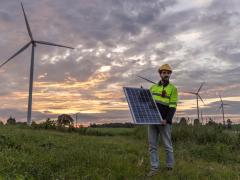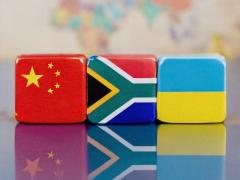The objective of of World Telecommunication and Information Society Day (WTISD) is to help raise awareness of the possibilities that the use of the Internet and other information and communication technologies (ICT) can bring to societies and economies, as well as of ways to bridge the digital divide. The origins of World Telecommunication and Information Society Day date back to the signing of the First International Telegraph Convention on 17 May 1865, which marked the establishment of the International Telecommunication Union (ITU).
In November 2005, the World Summit on the Information Society called upon the UN General Assembly to declare 17 May as World Information Society Day to focus on the importance of ICT and the wide range of issues related to the Information Society raised by WSIS

Telcolink director Cecil Mashawana believes more can be done to unlock the potential of digital solutions in transforming our country and economy.
“Events of the past several months have highlighted the increasing digital divide between those with access to information and technologies and those without. Even though the lockdown has exacerbated this divide, it has also put the spotlight on it, serving as a timely reminder that we as South Africans must collectively do more to change our society.”
Mashawana believes that ICT is the cornerstone of empowering all citizens with the skills required to become active participants in the economy.
“We are well-known as a country of entrepreneurs and people who are committed to overcoming the challenges typically associated to developing economies. Whether it is in the primary economy or in the township economy, there is a drive to succeed despite the circumstances.
Having access to reliable and affordable internet connectivity is a key enabler in this regard,” says Mashawana. He adds that it helps give our citizens the capacity to realise their potential and that this connectivity in fact, is as vital to our competitiveness as a country as having access to running water and electricity is.
Globally WTISD highlights how access has become a commodity on our collective path to a digitally connected world. Mashawana says that as bandwidth becomes more readily available and data pricing more affordable, access to technology will become democratised. This will help give more people the ability to equip themselves with the digital platforms needed to become successful.
“ICT must now centre on combining our know-how and innovative way of thinking with powerful tools that can transform the economy of the country and help spark change across the continent. Of course, this is an ongoing battle which requires the private and public sectors to join hands to overcome. Government needs the assistance of trusted and experienced ICT partners to help achieve their mandate to creating a digitally-driven ‘smart’ society. And the private sector needs policies and regulations that can help facilitate this in the most effective ways possible,” he says.
With innovations such as 5G, the Internet of Things, artificial intelligence, and machine learning becoming part of the fabric of our society, now is the time for South Africa to embrace the opportunities these provide. Whether it is hardware or software-based infrastructure, skills development initiatives, or just systems and processes that enable meaningful change, there is no turning back.
“South Africa is well-positioned to change and embrace ICT. Now is the time to do so and empower all our citizens,” he concludes.














